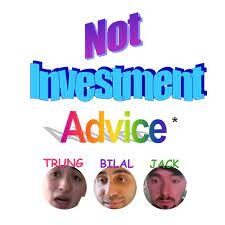Yesterday the film This Is Not Financial Advice premiered at the Tribeca Film Festival in front of a sold-out audience and I couldn’t be happier for Chris Temple and everyone involved with the project.
Last summer at the FutureProof conference, a conference I highly recommend all of the financial advisor readers to attend this summer, attendees were able to see a 15-minute world premiere sneak peek of the film highlighting the crazy behavior in the stock, crypto, and investment worlds in 2021. If you think back to what was going on during that time, there were a lot of insane storylines–crypto craze, the AMC and GameStop Reddit war against hedge funds, the rise of TikTok finance, and it just seemed like everything was going “to the moon.” The film captures many of these storylines through the personal stories of real people, in real time.
In addition the to preview, FutureProof-goers had the opportunity to hear from a couple of the stars of the film as they answered questions and shared updates on how things were going. By the time of the conference, the markets had cooled off (the markets were actually getting pummeled during the conference), and the excitement in the beginning of the film had certainly dwindled.
I was immediately hooked and couldn’t wait for the film to be released, and as luck would have it, I got to see an advance screening of the film thanks to my participation in a webinar one of the directors, Chris Temple, happened to be attending.
I won’t ruin the film but I wanted to put the film on your radar so you check it out when it becomes available outside of this weekend’s film festival and share a few reasons why I enjoyed the film so much.
First, this film is not a film about investing.
Yes, the individuals in the film are investing in crypto, stocks, options, and even sports cards, but in my opinion, the TINFA is a behavioral finance film, not an investing film. When you watch the film you will see firsthand why so many people struggle with personal finances–lack of education, the desire to get out of tough financial situations, FOMO, and how the human brain operates when money is involved.
As you watch, it will be easy to judge the decisions being made but don’t be so quick to make fun of or assume you would not be making the same decisions. You might not get into crypto but you might have experienced the same behaviors back in the tech bubble of the late 90’s, or you might in the coming AI bubble. The individuals in the film are real life people and you will “know” at least one of them in your life, you might even be one, which is powerful because it allows the viewer to have the opportunity to learn from their experiences.
Don’t miss the important lessons by focusing on the investments in the film–pay attention to the individuals, understand WHY they made the decisions they made, and identify how you are like them more than how you are unlike them.
I could spend an entire post on how I connected with each of the individuals in the film–the directors and the individuals did a great job pulling me into their stories. This is one of the reasons the film is so damn good.
Second, this film is shot beautifully.
As an inside-my-head-wannabe-film-producer (peep my mini-docs), I appreciate the cinematography more than most people, and most certainly most financial advisors, will. TINFA does not feel like a documentary—the camera work, the editing, the music, and the overall production are amazing. I think this was an important decision by the directors because viewers are going to stay with the film longer because it is appealing to the eyes.
As you watch the film, pay attention to the camera angles, the editing, the coloring, and everything that goes into the production and I hope you appreciate the effort, intent, and attention to detail that went into making the film. I wasn’t there but I’ve done enough video editing to know how hard it is to make a film look like TINFA.
And not only is the film shot beautifully but Optimist Films, the company behind it, is on my frequency. The name Optimist speaks to my eternally optimistic Self, and their mission to make “films with impact” speaks to my one-word mission statement: impact.
Third, the struggle is real.
The individuals in the film who made decisions will make you yell at the screen are not doing so because they are bad people. They are individuals who have grown up struggling, have been left to fend for themselves, and are trying to change the trajectory of their families’ lives by any means necessary and in 2021 that was making risky investment choices.
The stories in the film also show you how hard it is to change course when you’re committed to a narrative, especially when you’ve had a little success along the way. Again, this is a behavioral finance film, not an investment film.
Depending on where you find yourself in the class system we find in today’s world, you may not believe the struggle you hear people talk about because you’ve never lived it–you’ve never had exposure to some of the situations you will see in this film. While watching a film cannot get you proximate to the struggle so many people experience, but TINFA will help you understand that the struggle is real and it may not look like you think it would.
Fourth, individuals are learning about finance in new ways.
The internet and social media have proven to be both gifts and curses. The film highlights the role social media has played in the last few years in financial education. Individuals are no longer relying on traditional media to learn the financial principles our education system has failed to provide them. Instead of tuning into old white men in suits, this is getting better, on TV they are tuning into people who look like them, talk like them, and they can relate to on TikTok, Instagram, and YouTube.
The positive in the rise of social media financial education is more people are being exposed to conversations around finance–they are being exposed to stocks, bonds, crypto, compound interest, and other important principles. However, not every “expert” on social media knows what they are talking about and even worse, don’t have their viewers’ best interest at heart. We’ve seen a lot of scams and grift come to social media in the last few years, which has caused more harm to those who fell victim to the predators.
I’m hopeful that despite the scams and grift, the net benefit of the increased exposure to financial topics via social media will be positive because sometimes a financial blunder is the greatest teacher and prevents more severe and larger mistakes in the future. While I hate to see people lose money because of the dishonesty of another or by taking excessive risk without understanding what they are investing in, the lessons learned can help shape better money habits and be the event that helps and individual take a more responsible and successful approach to their finances.
Fifth, you can in fact change your life by taking an insane amount of risk.
As you’ll see, not everyone in the film experiences the downside of excessive risk. It is possible to take a lot of risk, understand the risk, be right, cash in, and take the success to more traditional things with money. Sometimes people get “lucky” and void disaster–I’m not sure if that is a good thing or not because it may provide the confidence to go bigger next time. We often want to judge people for taking more risk than we would, but there have been many people who took the right risk (and this applies outside of investing–think careers), changed their lives, and were able to proceed on a less risky path.
Finally, it was awesome to see friends on the screen.
Long-time readers know Morgan Housel is my all-time favorite financial writer, and they also know Josh Brown is a very important person to me as a mentor and friend. It was cool to see them both lend their expertise in the film.
This Is Not Financial Advice is a film I highly recommend–beyond getting an early sneak peek I have no connection to the film. I just really think it is a great film that you will find entertaining, you will learn important lessons beyond investing, and will become better at managing your finances and investing if you can learn from the behavioral finance in the film.
2021 will certainly repeat itself and hopefully, This Is Not Financial Advice will help more people avoid repeating the same choices in the film.
Here’s a short preview I’ll come back with the password to view once I get the ok from Chris and his team.
Disclaimer: Nothing on this blog should be considered advice, or recommendations. If you have questions pertaining your individual situation you should consult your financial advisor. For all of the disclaimers, please see my disclaimers page.




